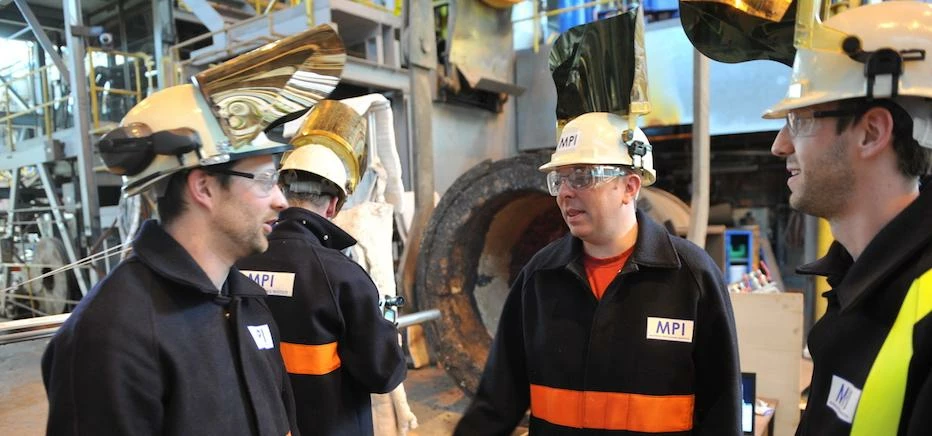
Partner Article
Space-age scientists swap Mars for Middlesbrough as Institute hosts research session
The Materials Processing Institute, based in Middlesbrough, has played host to a team of scientists keen to develop innovative technology, having previously been involved in a mission to Mars.
Researchers from IS-Instruments (ISI), based in Kent, specialise in commercialising space technology for process control in high-value manufacturing and are internationally respected in their field.
Previous space projects carried out by the five-strong team at ISI have included a piece of imaging equipment which to be used on a Mars Rover, technology that is now being adapted for use in its spectrometer products.
ISI director Dr Jon Storey and colleague Dr Ben Crutchley spent two days at the Materials Processing Institute using the centre’s high-tech equipment to test out a 3D stereo probe which could save the steel industry time and money if it proves successful.
The Institute, based in Teesside, is the UK’s oldest centre for industrial materials research and has opened its doors to companies outside of the steel sector, to make use of its research and development facilities.
Chris Paterson, a researcher in the Electronic Systems & Control Group at the Institute, said: “ISI specialises in laser technology and 3D imaging. We have worked with the ISI team in the past on a different project where we carried out laser inspection of slabs of steel.”
In the latest project, ISI built a 2m-long probe with cameras and a laser projection system installed in a water-cooled housing, which was inserted into a ladle that had been heated to 1600 degrees Celsius.
While inside the ladle, the probe was able to detect the quality of the surface and to take note of any cracks or problems which would need either repairing or replacing.
Chris added: “The project went well, there will be more tests in the future but in the long run this is something we would probably look to take on as a Government-funded project to see if we can develop it further.
“Obviously the ladles across the steel sector suffer from wear and tear, so if this probe is used regularly then it is something which could save time and money and improve safety at the same time.”
Dr Jon Storey said: “We initially worked with Tata Steel on a completely different instalment about three years ago, and we have been in regular contact with MPI since it was set up as a stand-alone organisation.
“We were offered the opportunity to do some testing, and the facilities at MPI allow us to do exactly what we need. They have a pilot plant which is exactly the same environment as a steel plant, and the access we have is invaluable.
“We cannot simulate the extremely high temperatures we require in a lab, so this is the next best thing for us.
“The testing all went well, the attitude is to plan for the worst and expect the best, but we are analysing the data now to see what amendments need to be made and we are confident everything is as it should be.
“We are grateful to MPI for their assistance, and look forward to developing our relationship in the future.”
The Institute, which was first founded almost 70 years ago, evolved to become the research and development arm, firstly of British Steel and more recently Tata Steel, before returning to its independent status in November of last year.
IS-Instruments’s project, HiTES3D, is funded through the Eureka Eurostars programme and InnovateUK.
Looking to promote your product/service to SME businesses in your region? Find out how Bdaily can help →
Enjoy the read? Get Bdaily delivered.
Sign up to receive our daily bulletin, sent to your inbox, for free.








 Raising the bar to boost North East growth
Raising the bar to boost North East growth
 Navigating the messy middle of business growth
Navigating the messy middle of business growth
 We must make it easier to hire young people
We must make it easier to hire young people
 Why community-based care is key to NHS' future
Why community-based care is key to NHS' future
 Culture, confidence and creativity in the North East
Culture, confidence and creativity in the North East
 Putting in the groundwork to boost skills
Putting in the groundwork to boost skills
 £100,000 milestone drives forward STEM work
£100,000 milestone drives forward STEM work
 Restoring confidence for the economic road ahead
Restoring confidence for the economic road ahead
 Ready to scale? Buy-and-build offers opportunity
Ready to scale? Buy-and-build offers opportunity
 When will our regional economy grow?
When will our regional economy grow?
 Creating a thriving North East construction sector
Creating a thriving North East construction sector
 Why investors are still backing the North East
Why investors are still backing the North East